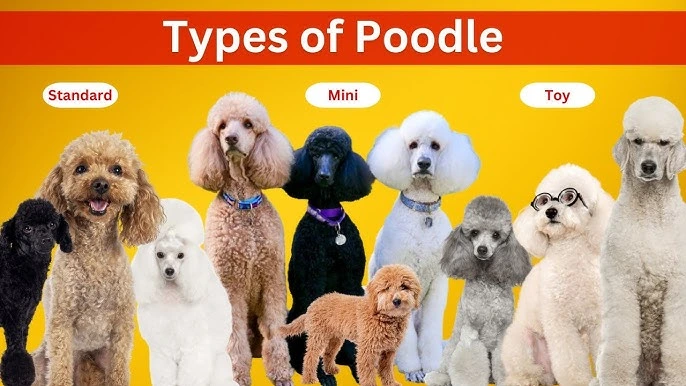In This Article
Poodles are celebrated for their elegance, intelligence, and versatility, making them one of the most beloved dog breeds worldwide. Originating in Germany as water retrievers, poodles have been Types of Poodles into three distinct sizes: Standard, Miniature, and Toy. Each type not only varies in size but also in temperament, energy levels, and suitability for different living environments, allowing prospective owners to choose the perfect match for their lifestyle.
The Standard Poodle is the largest of the trio, typically standing over 15 inches at the shoulder and weighing between 40 to 70 pounds. Renowned for their athleticism and high energy, Standard Poodles excel in dog sports such as agility and obedience, and they often serve as excellent family companions due to their loyal and friendly nature. In contrast, the Miniature Poodle, which stands between 11 to 15 inches and weighs around 15 to 17 pounds, offers a balance of spirited energy and adaptability, making them suitable for both active households and apartment living. The Toy Poodle, the smallest variety at under 10 inches and weighing 4 to 6 pounds, is perfect for those seeking a compact, affectionate companion that thrives in smaller living spaces. When comparing these three types, factors such as living space, activity level, and grooming requirements should be considered to ensure the chosen poodle type aligns with the owner’s lifestyle and preferences.
Standard Poodles: The Original Poodle
Standard Poodles are the largest and oldest variety of the poodle breed, originally bred in Germany as water retrievers before becoming popular in France and worldwide. Typically standing over 15 inches at the shoulder and weighing between 40 to 70 pounds, Standard Poodles possess a graceful and athletic build that reflects their active heritage. Their luxurious, curly coats come in a variety of colors, including white, black, apricot, and silver, requiring regular grooming to maintain their signature appearance. With a lifespan averaging between 12 to 15 years, Standard Poodles are known for their robust health and vitality, although they can be prone to certain genetic conditions such as hip dysplasia, progressive retinal atrophy, and Addison’s disease.
In terms of personality, Standard Poodles are highly intelligent, versatile, and eager to please, making them exceptional companions and performers in various dog sports like agility, obedience, and even hunting tasks. Their friendly and sociable nature makes them excellent family pets, as they are typically good with children and other animals. Additionally, their high energy levels require regular physical and mental stimulation to prevent boredom and destructive behaviors. Standard Poodles are also known for their strong protective instincts, making them attentive watchdogs without being overly aggressive. Proper training and socialization from an early age are essential to harness their intelligence and ensure they develop into well-rounded, balanced dogs.
Miniature Poodles: The Perfect Apartment Companion
Miniature Poodles are renowned for their compact size, intelligence, and adaptable nature, making them an ideal choice for apartment living. Standing between 11 to 15 inches tall and weighing approximately 15 to 17 pounds, Miniature Poodles offer the perfect balance of manageability and presence without overwhelming limited living spaces. Their elegant, curly coats come in a variety of colors, including black, white, apricot, and silver, and while they require regular grooming to maintain their distinctive appearance, their low-shedding fur makes them a suitable option for those with mild allergies. With a lifespan averaging 12 to 15 years, Miniature Poodles are not only charming companions but also long-term family members.
Beyond their physical attributes, Miniature Poodles are celebrated for their lively and affectionate personalities. Highly intelligent and eager to please, they excel in obedience training and are quick learners, which makes them well-suited for the structured environment of an apartment. Their playful yet gentle demeanor ensures they get along well with children and other pets, fostering a harmonious household. Despite their smaller size, Miniature Poodles possess a spirited energy level that requires regular physical and mental stimulation through daily walks, interactive play, and training sessions to prevent boredom and promote overall well-being. Additionally, they are generally healthy dogs, though potential owners should be aware of breed-specific health issues such as progressive retinal atrophy and hip dysplasia. When properly cared for, Miniature Poodles thrive in apartment settings, providing loyal companionship and joy to their owners.
Toy Poodles: The Smallest of the Poodle Types
Toy Poodles are the diminutive yet equally elegant members of the poodle family, cherished for their petite size, intelligence, and affectionate nature. Standing under 10 inches tall at the shoulder and typically weighing between 4 to 6 pounds, Toy Poodles are perfectly suited for those seeking a compact companion without sacrificing the distinctive charm and grace associated with the breed. Their luxurious, curly coats come in a myriad of colors, including black, white, apricot, and various shades of brown, requiring regular grooming to prevent matting and maintain their stylish appearance. With an impressive lifespan of 12 to 16 years, Toy Poodles are not only delightful pets but also long-term family members. Their low-shedding fur makes them a favorable option for individuals with mild allergies, further enhancing their appeal as indoor companions.
Beyond their physical attributes, Toy Poodles are celebrated for their lively and affectionate personalities. Highly intelligent and quick to learn, they excel in obedience training and thrive in environments that provide mental stimulation and consistent interaction. Their playful yet gentle demeanor makes them excellent companions for individuals and families alike, as they tend to get along well with children and other pets. Despite their small stature, Toy Poodles possess a spirited energy that necessitates regular physical activity and interactive play to keep them happy and healthy. They are also known for their alertness, making them effective watchdogs that will promptly notify their owners of any unusual activity without being overly aggressive. Health-wise, Toy Poodles are generally robust, though potential owners should be mindful of breed-specific concerns such as patellar luxation, progressive retinal atrophy, and certain dental issues. With proper care, training, and socialization, Toy Poodles make charming and resilient companions, perfectly suited to a variety of living situations, including apartments and smaller homes.
What About Teacup Poodles?
Teacup Poodles have gained popularity in recent years as ultra-small companions, appealing to those who desire a diminutive version of the beloved poodle breed. However, the term “teacup” is not officially recognized by major kennel clubs such as the American Kennel Club (AKC) or the Fédération Cynologique Internationale (FCI). Instead, it is primarily used by certain breeders and pet marketers to describe exceptionally small poodles that fall below the standard size classifications of Toy, Miniature, and Standard Poodles. While the allure of owning a pocket-sized poodle is strong, prospective owners should approach teacup poodles with caution due to the potential health risks and ethical concerns associated with their breeding.
Teacup Poodles are typically bred to be smaller than Toy Poodles, often weighing under 4 pounds and standing less than 8 inches tall. Achieving such tiny sizes often involves selective breeding practices that can lead to numerous health issues, including hypoglycemia (low blood sugar), respiratory problems, dental issues, and a higher susceptibility to fractures and other injuries. Additionally, the rapid growth required to reach adulthood can place undue stress on their developing bones and joints, increasing the likelihood of skeletal deformities and chronic pain. Responsible breeders prioritize the health and well-being of their dogs over achieving extreme sizes, ensuring that poodles maintain the robust health and longevity that the breed is known for. Prospective owners interested in teacup poodles should thoroughly research breeders, seek veterinary advice, and consider the ethical implications of supporting breeding practices that may compromise animal welfare. Ultimately, while teacup poodles may appear charming and convenient for small living spaces, the potential for serious health problems makes them a less advisable choice compared to their standard-sized counterparts.
Standard Poodles vs. Miniature Poodles vs. Toy Poodles
Although Standard, Miniature, and Toy Poodles have several common traits, including their intelligence and distinctive curly fur, each size category possesses unique characteristics. Here are some key factors to consider when comparing the different Poodle sizes:

Choosing the Right Poodle for You
Selecting the ideal poodle type to complement your lifestyle involves a thorough understanding of the distinct characteristics and requirements of each size variation. Whether you’re drawn to the grandeur of a Standard Poodle, the balanced nature of a Miniature Poodle, or the compact charm of a Toy Poodle, it’s essential to evaluate factors such as living space, activity level, grooming needs, and family dynamics. Making an informed choice ensures a harmonious and fulfilling relationship with your canine companion.
When deciding which poodle best fits your life, consider not only the physical size but also the temperament and health considerations associated with each type. Standard Poodles are well-suited for active families and spacious homes, while Miniature Poodles offer versatility for both energetic and relaxed environments. Toy Poodles, with their petite stature, thrive in smaller living spaces and are perfect for those seeking an affectionate and manageable pet. Additionally, understanding the grooming requirements and potential health issues of each poodle size can help you make a choice that aligns with your long-term commitment to pet ownership.
Key Factors to Consider When Choosing a Poodle
1. Size and Living Space
- Standard Poodles: Standing over 15 inches and weighing between 40 to 70 pounds, they require ample space and regular exercise, making them ideal for homes with yards.
- Miniature Poodles: Measuring 11 to 15 inches and weighing around 15 to 17 pounds, they adapt well to both active households and apartment living.
- Toy Poodles: At under 10 inches and 4 to 6 pounds, they are perfect for smaller spaces and urban living environments.
2. Activity Level and Lifestyle
- Standard Poodles: Highly energetic and excel in dog sports like agility and obedience, suitable for active individuals or families.
- Miniature Poodles: Offer a balance of spirited energy and adaptability, fitting for moderately active lifestyles.
- Toy Poodles: Possess moderate energy levels, enjoying interactive play and short walks, ideal for less active owners.
3. Grooming and Maintenance
- All poodle types require regular grooming to maintain their curly coats and prevent matting.
- Standard Poodles: May need more time and effort due to their larger size and longer coats.
- Miniature and Toy Poodles: Require consistent grooming but are generally easier to manage on a smaller scale.
4. Temperament and Family Compatibility
- Standard Poodles: Known for their friendly and protective nature, making them excellent family pets.
- Miniature Poodles: Adaptable and social, getting along well with children and other pets.
- Toy Poodles: Affectionate and gentle, perfect for individuals or families seeking a smaller, loving companion.
5. Health Considerations
- Be aware of breed-specific health issues such as hip dysplasia in Standard Poodles, patellar luxation in Toy Poodles, and progressive retinal atrophy across all sizes.
- Choosing a reputable breeder who screens for genetic health problems can help ensure a healthier pet.
6. Lifespan and Long-term Commitment
- Poodles generally have long lifespans, ranging from 12 to 16 years depending on the size.
- Consider the long-term commitment required for care, training, and veterinary needs throughout your poodle’s life.
All Poodles, regardless of their size, should be socialized during their puppy stages, provided with a healthy diet, and trained using positive reinforcement techniques. To ensure you select the most suitable Poodle for your household, it is crucial to conduct thorough research and partner with a reputable breeder who can assist you in finding the perfect match.



